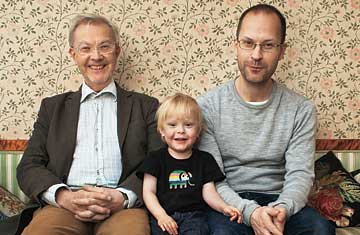
Three generations: Dr. Lars Olov Bygren, with son Magnus and grandson Ludvig in Stockholm
The remote, snow-swept expanses of northern Sweden are an unlikely place to begin a story about cutting-edge genetic science. The kingdom's northernmost county, Norrbotten, is nearly free of human life; an average of just six people live in each square mile. And yet this tiny population can reveal a lot about how genes work in our everyday lives.
Norrbotten is so isolated that in the 19th century, if the harvest was bad, people starved. The starving years were all the crueler for their unpredictability. For instance, 1800, 1812, 1821, 1836 and 1856 were years of total crop failure and extreme suffering. But in 1801, 1822, 1828, 1844 and 1863, the land spilled forth such abundance that the same people who had gone hungry in previous winters were able to gorge themselves for months.
In the 1980s, Dr. Lars Olov Bygren, a preventive-health specialist who is now at the prestigious Karolinska Institute in Stockholm, began to wonder what long-term effects the feast and famine years might have had on children growing up in Norrbotten in the 19th century--and not just on them but on their kids and grandkids as well. So he drew a random sample of 99 individuals born in the Overkalix parish of Norrbotten in 1905 and used historical records to trace their parents and grandparents back to birth. By analyzing meticulous agricultural records, Bygren and two colleagues determined how much food had been available to the parents and grandparents when they were young.
Around the time he started collecting the data, Bygren had become fascinated with research showing that conditions in the womb could affect your health not only when you were a fetus but well into adulthood. In 1986, for example, the Lancet published the first of two groundbreaking papers showing that if a pregnant woman ate poorly, her child would be at significantly higher than average risk for cardiovascular disease as an adult. Bygren wondered whether that effect could start even before pregnancy: Could parents' experiences early in their lives somehow change the traits they passed to their offspring?
It was a heretical idea. After all, we have had a long-standing deal with biology: whatever choices we make during our lives might ruin our short-term memory or make us fat or hasten death, but they won't change our genes--our actual DNA. Which meant that when we had kids of our own, the genetic slate would be wiped clean.
What's more, any such effects of nurture (environment) on a species' nature (genes) were not supposed to happen so quickly. Charles Darwin, whose On the Origin of Species celebrated its 150th anniversary in November, taught us that evolutionary changes take place over many generations and through millions of years of natural selection. But Bygren and other scientists have now amassed historical evidence suggesting that powerful environmental conditions (near death from starvation, for instance) can somehow leave an imprint on the genetic material in eggs and sperm. These genetic imprints can short-circuit evolution and pass along new traits in a single generation.
